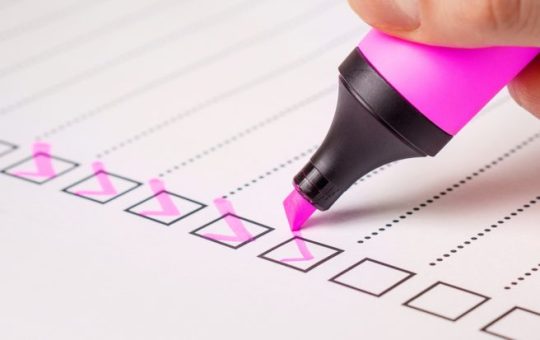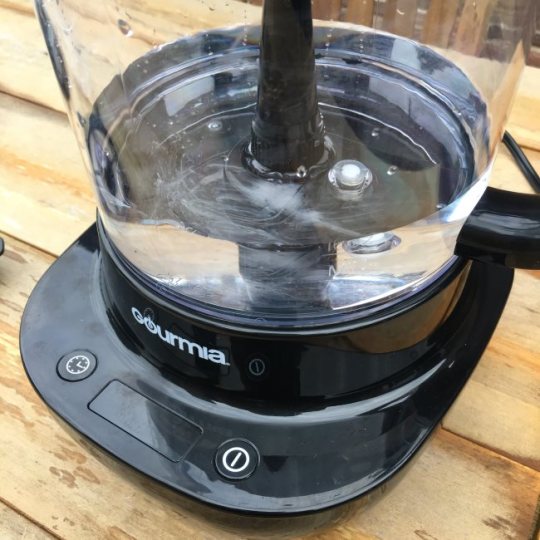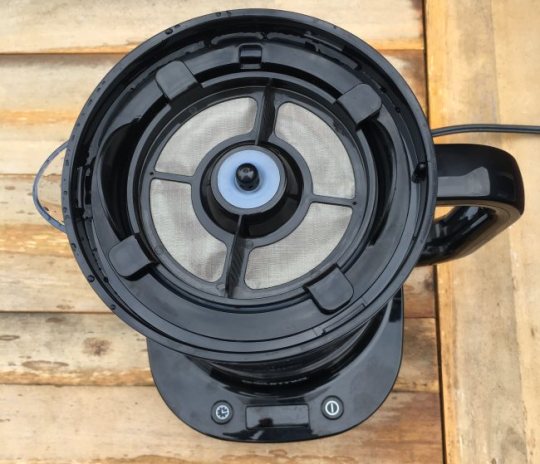No legalese here, just my thoughts on the country and where we're headed. Straight talk, uncensored. My Google+ profile
Don't wanna be here? Send us removal request.
Text
At Least You're Not This Guy - See Also
BIGLAW PARTNER SUSPENDED FOR WATCHING PORN AT WORK: I'm probably at the point where I would rather walk in on my colleagues watching literal porn than watching a presidential press conference. CRAVATH ANNOUNCES ALL-WOMEN CLASS OF PARTNERS: This story is the right chaser for that first one. RELEASING JUVENILE DEFENDANTS TO OWN THE LIBS: Texas judge who lost re-election is salty. DID THEY VET MATT WHITAKER AT ALL? Here's scandal Whitaker is involved in that was totally publicly available before he was illegally appointed to oversee an investigation he's publicly disparaged. THE U.N. SHOULD SANCTION US: Trump's asylum rule puts us in violation of U.S. law, international law, and human rights standards.

0 notes
Text
Stovetop Espresso Brewing Tutorial
This is a quick tutorial on the stovetop espresso maker. It is also known as a Moka Pot and is sold under the name Bialetti. Let's get started. #1 Fill the Bottom Chamber with Water Fill the...

0 notes
Text
Check Out The Big Brain On Brett!
Some genius created this video.

0 notes
Text
On the Impact of China Tariffs: Is This a Dead Cat Bounce?

Investopedia defines a dead cat bounce as follows:
A dead cat bounce is a temporary recovery from a prolonged decline or a bear market that is followed by the continuation of the downtrend. A dead cat bounce is a small, short-lived recovery in the price of a declining security, such as a stock. Frequently, downtrends are interrupted by brief periods of recovery - or small rallies - where prices temporarily rise. The name “dead cat bounce” is based on the notion that even a dead cat will bounce if it falls far enough and fast enough.
Outside investing, the term is sometimes used to refer to a situation where things are looking really good simply because everyone is going wild to prepare for when they get really bad. I am getting a strong sense that is what has been happening of late with US-China trade.
First though a bit of a backstory. Our law firm has a long history of representing American companies (mostly fishing and mining and timber) in the Russian Far East and representing Russian companies seeking to do business in the United States. Fifteen years ago, this practice of ours was booming but the Great Recession had a deleterious impact on this practice and bad relations between the United States and Russia have reduced it to maybe 5% of what it once was. Fast forward back to a few years ago when the United States and Russia were both talking about initiating sanctions against the other. One would think all this talk would have further reduced our Russia practice but it actually had the opposite effect.
The more talk of sanctions, the more Russian related legal business we got, mostly from people in Russia wanting to do things in and with the United States before US sanctions hit them and American businesses wanting to do things in and with Russia before Russian sanctions hit them. Then when the sanctions were actually announced our business increased even further as we started representing companies that had disputes - either with their counter-party in the other country or with governments alleging they had violated the sanctions or owed lots of money in duties or fines. And then eventually the lights went out. Like nearly totally out.
We are right now in what feels like the middle of the bounce as between the US and China. The Asia manufacturing lawyers at my firm are all working harder than ever trying to accommodate companies (mostly US) eager to conclude deals with China as quickly as they possibly can. Typical work for our Asia manufacturing lawyers in the last few months has consisted of the following:
Companies that have been buying from China for many years with no or bad contracts are coming to us seeking China manufacturing contracts on “an expedited basis.” Their reasons for this change usually relate to the fact that they did not feel they needed a contract when they were buying $60,000 of product at a time but now that they are going to be buying $2.5 million to beat the tariffs, they are a lot more risk averse.
Client companies that have been buying from China for 3-5 years on contracts we drafted for them 3-5 years ago are calling us for new contracts. Some of these people want us to modify their existing China contracts to account for existing and potential tariffs and currency fluctuations and others want us to draft contracts with their new manufacturers in Vietnam, Thailand, Indonesia, Malaysia, Pakistan, Turkey, Mexico or wherever.
In the meantime and as expected - our international trade lawyers have been working super long hours as well these days. They are being called on for urgent help with the following:
Helping companies secure exemptions from tariffs. For more on this, check out China Tariffs and What to do Now, Part 1 and China Tariffs and What to do Now, Part 2.
Helping companies figure out how they can have their products made in countries outside China (so far it's been mostly in Vietnam, Thailand, Indonesia, Malaysia, Pakistan, Turkey and Mexico) using just few enough components from China so as to qualify their “new” products as having legitimately NOT been made in China for US tariff purposes.
Helping companies figure out whether what their Chinese manufacturers are telling them about how the products are now being made in Taiwan or in Malaysia or wherever and therefore will not be subject to duties. Note that so far at least every single time this claim has proven to be false. In other words, just because someone says their product is no longer being made in China and just because they have some sort of certificate from some country other than China claiming the product was in fact made in a country other than China, it likely was not. If you are the one importing the product into the United States you (not your Chinese factory or anyone else) are responsible for knowing where the product was made and for paying the tariffs if the product qualifies as having been made in China.
So for now at least our China practice and our international trade law practice are both booming and this state of affairs holds true for every China lawyer, every manufacturing lawyer and every international trade lawyer with whom I have spoken in the last three months. An old adage about lawyers is that we do well when times are good and when times are bad, just not when things are staying the same. That has been the case so far.
Not surprisingly, it is not just international lawyers at full capacity these days, American and European companies that do business with Asia (mostly) are seeing many choke points as well. We are hearing the following from our clients and our readers:
We are hearing that the Chinese government has increased the VAT rebate for exports from 13% to 16% to encourage more exports.
The RMB has depreciated and that means Chinese goods are cheaper than they were, further encouraging exports.
“Everything along the supply chain is at or near full capacity right now. We are hearing that both China and US West Coast ports are really busy and ships are full and shipping costs are rising.
The time for getting products from Asia through U.S. customs and getting products from the United States through China customs has greatly increased. This is due in part to the increase in shipment volumes, but also because customs officials in both countries are “going through everything with a fine-tooth comb” that comes from the other country. No surprise, right?
An old China hand friend of mine put it this way: “Prices are rising at every point. Tariffs, freight forwarding, shipping and trucking are all going nuts. It is one big clusterf–k.” He went on to say that he expects things to get considerably worse over the next few weeks because of the new and widespread tariffs and because of the upcoming Christmas/Holiday Season. “Everyone is and will be racing to get their products to port to avoid the possibility of more and increased tariffs in January; everything is going to go into hyperdrive like nobody has ever seen before.”
Our international litigation lawyers are already seeing an increase in disputes related to late delivery and shipping disputes.
So for now, things are booming but for how long will this last? Will there be a crash in February or when or not at all?
What are you seeing out there?








0 notes
Text
Quick Question Friday: China Law Answers, Part 67

Because of this blog, our China lawyers get a fairly steady stream of China law questions from readers, mostly via emails but occasionally via blog comments or phone calls as well. If we were to conduct research on all the questions we get asked and then comprehensively answer them, we would become overwhelmed. So what we usually do is provide a quick general answer and, when it is easy to do so, a link or two to a blog post that provides some additional guidance. We figure we might as well post some of these on here as well. On Fridays, like today.
At least twice a month, one of our China lawyers will get an email from someone (usually an American or an Australian or a Brit) who has lived in China for one to three years and who now wants to attend a law school to eventually become a China lawyer. This person will ask us which law school they should attend to best prepare for a career as a China lawyer. Oftentimes they will tell us about how such and such law school looks good to them because it offers three courses on Chinese law and are we aware of any other law school with more such courses.
My response is always pretty much the same and it goes something like this:
Don't worry about choosing a law school with Chinese law courses. Very few of your potential employers will ever look at or care much about the courses you took in law school. Generally speaking, if you want to become a China attorney, the three best things you can do are the following:
1. Get into and attend the best law school you can.
2. Get the best grades you possibly can in law school.
3. Work on your Chinese language skills as much as possible. Being able to read and write Mandarin is far more valuable than being able to just speak it.
Got it?








0 notes
Text
Arbitration For Some, Tiny American Flags For Others - See Also
IT'S LABOR DAY WEEKEND: Fitting that our time's most famous labor organizer, Colin Kaepernick, won a major battle against his former employers. BANKRUPTCY: Comes for this California law firm. MARY JO WHITE DID A BAD JOB HOLDING URBAN MEYER ACCOUNTABLE: Now in podcast form. PART TWO OF A SERIES ON CLASSISM IN ACADEMIA: I am elitist enough to not care about this issue, and black enough to read every word. NET NEUTRALITY ISN'T THE ONLY HORRIBLE THING COMING OUT OF THE FCC: Take a look at what Comcast is trying to do.

0 notes
Text
How to Make V60 Coffee
One of the things I love about crafting a great cup of coffee is just how easy it actually can be to make a good one consistently. But most of the time this actually rules out certain brewing...

0 notes
Text
Please Enjoy Another Weekend As The Republic Careens Towards Fascism - See Also
WE REALLY DON'T CARE IF YOUR LAW PROFESSOR WAS NICE: If she's going to serve this president on the Supreme Court, she's still an ass. HERE'S SOME MORE STUFF ABOUT THE HORSERACE TO FIGURE OUT WHO WILL RUBBER STAMP TRUMP'S FEVER DREAMS: They all look the same to me. HERE'S A STORY I WROTE THAT I REALLY DON'T CARE ABOUT: But I understand if associates at this below market firm do. STACI MADE A GOOD TEXAS REFERENCE IN THIS RAISE STORY: "Lasso" raises. Nice. OCI IS AROUND THE CORNER: Here's everything you need to know.

0 notes
Text
China SaaS: The Basics

China SaaS. It's complicated.
With the launch of the US-China trade war, it should go without saying that China is tough on foreign internet companies doing business in China. Foreign SaaS (Software as a Service) companies are on the front lines of China's internet and the legalities of their operating in China are complicated and generally unfavorable.
Our China lawyers who focus on China's internet typically send out some variant of the following email to foreign SaaS companies to give them an initial lay of the China SaaS land:
The basic position of the PRC government regarding foreign SaaS is as follows :
1. Provision of SaaS services to Chinese nationals through a server maintained outside of China is not legal.
2. Storage of personal information gained during the processing of SaaS services on servers located outside of China is generally not legal.
3. The PRC enforces these above two rules in the following two ways:
a. Conversion of RMB for payment for offshore server SaaS services is not permitted.
b. The URL allowing contact to the offshore server is subject to being blocked. Use of a VPN to access a blocked server is illegal.
Unlike France and some other European countries, China does not typically seek to enforce its laws through extraterritorial action. 3 a. and b. are generally the only methods of enforcement used. However, these methods are very effective.
Many companies operate in this illegal realm, knowing they will likely not be pursued by the Chinese government in their home country. As long as they (the company and anyone who China might associate with the company) stay out of China, this attitude is probably rational. However, it is not usually possible to build a real business this way. But this “offshore server” approach is usually considered to acceptable by companies without real long-term interest in China.
To operate legally in China, a PRC based server is required and the arrangement requires licensing to a Chinese owned entity. This is the approach Microsoft and Apple use for their China Cloud/SaaS products. Setting up Cloud/SaaS operations in China with this sort of licensing approach is complex, but it is necessary and for that reason it has become very common.








0 notes
Text
China Expat Employment Contracts Because They Matter. A Lot.

Hardly a day goes by without one of our China employment lawyers getting an email or a phone call asking whether we can help them with such and such employment law matter with their existing or (usually) their ex-employer. Many times they will briefly describe their situation and conclude their email with something like, “do I have a case.” Our employment attorneys nearly always respond with something like the following:
We do not know and for us to know we would first need to run a conflict check to make sure we do not represent your employer. Most importantly, we also will need to review your employment contract and we probably will also need to briefly research China's national employment laws and the local employment laws in your area as well.
And guess what? Much of the time when we do review these contracts they are just terrible for the expat employee. Like really really terrible. We then have to tell the expat that there is little to nothing we can do beyond trying to make their transition to any new job as smooth as possible.
Even though we are pretty certain we know what their answer will be before we ask it, we then ask whether any attorney reviewed their employment contract for them before they signed it. We ask this NOT to emphasize the need to use a China employment lawyer before signing a China employment contract, but on the off chance that their contract was actually reviewed by a lawyer who might be willing to pay the employee some money for having done such a poor job on the contract. So far, no such luck as the response has always been either “no” or “no, it just never occurred to me that might be necessary” or “there was no point because it was just a form contract anyway.” Ugh.
If you are an expat working in China or seeking a job in China or even just renewing your contract with your current employer and it is for a substantial job with a substantial salary, you should have an experienced China employment lawyer review your China employment contract before you sign it. This is especially true if you will be working for a Chinese domestic company. This is also true even if you are given a “form” contract. Many companies use some sort of template or form document for their employees but this does not in any way mean you should not have a qualified lawyer review what you will be signing. Just because the employer uses a template does not mean you will be protected nor does it mean you cannot or should not negotiate the changes you need in it.
In fact, the window after you are offered the job and before you sign the employment contract to take the job is usually the best time to go “back and forth” with your employer to make sure the terms and conditions in your proposed employment contract are as favorable to you as possible. Once you sign your employment contract and begin working, that window has closed and your employer has very little incentive to revise or add anything to your contract.
Your proposed employment contract should be reviewed to make sure it protects you and includes everything you need or want to be included. To the extent there are ambiguous terms, take the time to seek clarification. And make sure that what you have been promised orally or in some other writing that is not in your employment contract goes in your employment contract. Do not be pressured into signing an employment contract by an arbitrary deadline. If they want you on their team, they can and they will wait a couple of extra days for you to get your employment contract right.
Even on those provisions you cannot change, a good attorney review will give you actionable information for the future. What provisions in your employment contract are illegal and therefore not enforceable against you? What provisions are unfavorable or unfair to you? What matters important to you are missing? Answers to questions like these will give you clarity and help you decide whether to take the job or not. They also will let you know what you can and cannot do if you do take the job.
But in our experience, employers are nearly always willing to make concessions to get the expat on board as an employee. Employers are often reluctant to make changes to their form contracts but far more willing to add things to it. For example, if a bonus is created just for your position, you should make sure this bonus is mentioned in your employment contract and that it specifies how much and when and under what conditions you will receive it. Far too often expats are offered a guaranteed bonus that is not mentioned anywhere in their contract.
On a related note, “yin-yang” contracts are never a good idea for either the employer or the employee. These are contracts where the employer offers the expat an employment contract the expat knows is a fake. The real deal between the employer and the expat employee is in a different document or not in writing at all. These yin-yang contracts are illegal and usually done to skirt taxes and they pretty much invariably lead to trouble. Just don't do it.
Bottom Line: Expats looking to work in China should have their employment contracts reviewed by a China employment lawyer before they sign it, not after. This is way cheaper and way better in the long run. Trust us on this.








0 notes
Text
Coffee Gear That Won't Break the Bank (2018)
Making great coffee at home is something that should be easy and inexpensive. With the right equipment and our Coffee Brewing Guide, it is. Here on INeedCoffee, we have a comprehensive list of the...

0 notes
Text
Prismo Filter Upgrade For AeroPress Review and Tips
Fellow recently developed the Prismo, which is a custom filter for making espresso shots using the AeroPress. Is it really possible to make espresso shots with the Prismo filter for the...

0 notes
Text
Gaming the System? Foreign Access to China's Online Gaming Industry

China online gaming laws. It's complicated.
Online gaming in China is subject to the same overall regulatory framework that applies to software as a service (SaaS) in China.
The regulatory framework comprises no less than a dozen key components that have developed over the past twenty years or so. The development has not evolved neatly. Earlier regulations have not been comprehensively replaced or modified by later regulations. Rather, the development has been somewhat haphazard; with an apparent tension between the various authorities competing for control of the relevant sectors. A painstaking chronological analysis is therefore required to discern those threads surviving or running consistently throughout. As is always the case in China, the regulatory framework includes certain inconsistencies and loose ends, and the authorities may not always interpret the regulations in a manner consistent with a plain reading.
We explored these regulations in Selling SaaS in China: Resistance is Futile. As we noted in that post, the lawful delivery of SaaS in China requires a platform hosted on a server located in China and operated by a Chinese-owned entity. The operating entity must have direct contact with Chinese consumers and must have the required licenses and approvals. A system is required for the proper handling of the gamers' personal information in accordance with Chinese cyberlaw.
Foreign online gaming companies often balk at these restrictions or expect simple workarounds.
One popular but flawed workaround involves a “variable interest entity,” or “VIE.” There are still people in the tech sector who believe these entities can be used to overcome the regulatory hurdles. A VIE involves Chinese partners holding assets on behalf of foreigners in sectors from which those foreigners are excluded. These structures are unsupported by law and the sector perception is based on myths and legends and history that no longer jibes with the present day. Our China lawyers have seen companies waste a lot of time and money on illegal structures over which the foreigners have no effective control.
Another flawed workaround involves delivery of online games to Chinese nationals from foreign servers. This is popular because it circumvents the requirements on what needs to be housed on Mainland servers. In taking this route, many foreign gaming companies ultimately compromise their access to the Chinese gaming market. Most Chinese do not use VPNs, so the foreign servers are hard for them to locate and are even harder for the foreigners to properly market. Foreign gaming companies also run the risk of having their games blocked when they are distributed this way.
For these reasons, we conclude that resistance to the regulations is futile. Especially if you are a serious player.
To gain full access to the Chinese market, online gaming companies must comply with the regulations by identifying and co-operating with the right Chinese companies. The biggest problem is usually finding an appropriate Chinese partner or licensee - one with all of the required licenses and approvals. We have identified and analyzed the requirements an appropriate Chinese company must satisfy. Not less than 6 separate licenses and permits are required. As is so often the case in China, confirming whether a Chinese company has (or could hope to have) these licenses and permits is a relatively simple matter of due diligence. Again, we see a lot of time and money wasted on deals with Chinese companies that lack the necessary capacity.
In most instances, the only PRC companies with the capacity to obtain the necessary licenses and permits are major internet service providers with established gaming platforms. Proper marketing to Mainland gamers will be effectively impossible without the involvement of such companies in any event. Typically, these companies will expect the foreign game supplier to provide a turnkey or pre-installed solution and to give them an interest in the underlying technology and game IP. They will also take a certain share of gross receipts. So, even when you've found a Chinese company with the necessary capacity you need to understand their commercial requirements well in advance so you can decide whether they even make sense for you.








0 notes
Text
Gaming the System? Foreign Access to China's Online Gaming Industry

China online gaming laws. It's complicated.
Online gaming in China is subject to the same overall regulatory framework that applies to software as a service (SaaS) in China.
The regulatory framework comprises no less than a dozen key components that have developed over the past twenty years or so. The development has not evolved neatly. Earlier regulations have not been comprehensively replaced or modified by later regulations. Rather, the development has been somewhat haphazard; with an apparent tension between the various authorities competing for control of the relevant sectors. A painstaking chronological analysis is therefore required to discern those threads surviving or running consistently throughout. As is always the case in China, the regulatory framework includes certain inconsistencies and loose ends, and the authorities may not always interpret the regulations in a manner consistent with a plain reading.
We explored these regulations in Selling SaaS in China: Resistance is Futile. As we noted in that post, the lawful delivery of SaaS in China requires a platform hosted on a server located in China and operated by a Chinese-owned entity. The operating entity must have direct contact with Chinese consumers and must have the required licenses and approvals. A system is required for the proper handling of the gamers' personal information in accordance with Chinese cyberlaw.
Foreign online gaming companies often balk at these restrictions or expect simple workarounds.
One popular but flawed workaround involves a “variable interest entity,” or “VIE.” There are still people in the tech sector who believe these entities can be used to overcome the regulatory hurdles. A VIE involves Chinese partners holding assets on behalf of foreigners in sectors from which those foreigners are excluded. These structures are unsupported by law and the sector perception is based on myths and legends and history that no longer jibes with the present day. Our China lawyers have seen companies waste a lot of time and money on illegal structures over which the foreigners have no effective control.
Another flawed workaround involves delivery of online games to Chinese nationals from foreign servers. This is popular because it circumvents the requirements on what needs to be housed on Mainland servers. In taking this route, many foreign gaming companies ultimately compromise their access to the Chinese gaming market. Most Chinese do not use VPNs, so the foreign servers are hard for them to locate and are even harder for the foreigners to properly market. Foreign gaming companies also run the risk of having their games blocked when they are distributed this way.
For these reasons, we conclude that resistance to the regulations is futile. Especially if you are a serious player.
To gain full access to the Chinese market, online gaming companies must comply with the regulations by identifying and co-operating with the right Chinese companies. The biggest problem is usually finding an appropriate Chinese partner or licensee - one with all of the required licenses and approvals. We have identified and analyzed the requirements an appropriate Chinese company must satisfy. Not less than 6 separate licenses and permits are required. As is so often the case in China, confirming whether a Chinese company has (or could hope to have) these licenses and permits is a relatively simple matter of due diligence. Again, we see a lot of time and money wasted on deals with Chinese companies that lack the necessary capacity.
In most instances, the only PRC companies with the capacity to obtain the necessary licenses and permits are major internet service providers with established gaming platforms. Proper marketing to Mainland gamers will be effectively impossible without the involvement of such companies in any event. Typically, these companies will expect the foreign game supplier to provide a turnkey or pre-installed solution and to give them an interest in the underlying technology and game IP. They will also take a certain share of gross receipts. So, even when you've found a Chinese company with the necessary capacity you need to understand their commercial requirements well in advance so you can decide whether they even make sense for you.








0 notes
Text
Make Cold Brew Coffee Quickly with the Gourmia Automatic Cold Brewer
In several tutorials here on INeedCoffee, we show you how easy it is to make cold brew coffee at home. Soak coffee grounds in water for 12-36 hours, filter, and you're done. The only step left is to chill the finished brew. So what makes one cold brewer better than the next? Volume, the quality of the filter, how easy it is to clean up, and how good it looks on your counter. That was it. Until now.
Gourmia came in and solved the one variable everyone else took for granted: The Wait. Why must we wait 12-36 hours for cold brew coffee? Does it have to take so long? Can we speed up the process?
The reason we wait so many hours for cold brewed coffee is that the coffee grounds are just sitting in motionless water, slowly releasing their flavor. Very slowly. What if throughout the brew cycle the water gently agitated the coffee grounds to accelerate the release of flavor? You could reduce the brew time.
This is what the Automatic Cold Brewer by Gourmia does.
Depending on how rich you want your cold brew, the Gourmia will softly push the water evenly over the coffee grounds for a period of 10 to 40 minutes. This is followed by an optional cooling cycle of around 6 minutes. What this means is that you can have filtered cold brew coffee from set up to finish in minutes.

Gourmia Automatic Cold Brewer (Amazon USA)
The Equipment
When you unbox the Gourmia Cold Brewer, you will see several parts. Don't be overwhelmed. It is really easy to get started and the documentation is well-written. The first thing you'll want to do is remove all the plastic wraps covering the different sections. Then wash and dry everything.

This photo shows the different parts of the Gourmia Automatic Cold Brewer.
From top to bottom: Lid, Top Filter on the Coffee Basket, Ice Basket, Pitcher, Removable Fountain (inside Pitcher), and the Main Unit. Note that the Coffee Basket is used only during the brew cycle and the Ice Basket is only used during the chilling cycle.
Cold Brew or Cold Brew Concentrate?
Before you start to brew, you will decide how strong you want to make your cold brew. There are four settings, each corresponding to a brew strength.
Light – 10 minutes
Medium – 20 minutes
Bold – 30 minutes
Concentrate – 40 minutes
Gourmia recommends using a Medium-Coarse grind for all the settings, however, if you wanted to make a strong coffee in 10 minutes, just tighten up the grind to Medium. If you find that you've used a grind too fine and your coffee is too strong, you can always add water to bring the coffee to the strength level you prefer most.
Brew Quantities
There are three markings on the side of pitcher indicating different brew quantities. Each level has a different coffee requirement. This information is in the instructions, but I'll reprint it here in case you've misplaced yours.
10 ounces water – 25 grams or 5 teaspoons ground coffee
16 ounces water – 40 grams or 8 teaspoons ground coffee
24 ounces water – 60 grams or 12 teaspoons ground coffee
The brew chamber can hold a lot more water, but don't be tempted to make more than 24 ounces, because the basket that holds the ground coffee is limited to around 60 grams. Adding more water will only result in a weaker brew. You can add water post-brew if it tastes too strong to you.
Step By Step Brewing Instructions
The Gourmia Automatic Cold Brewer has two phases.
Brewing Cycle
Chilling Cycle
Phase two is optional. You do not need to use the brewer to perform the cooling, but if you are having the coffee right away, use it. Otherwise, bottle the coffee and place in the frig.
#1 Add the Removable Fountain
Twist the Removable Fountain clockwise into the bottom of the pitcher before adding water.
#2 Add Water
Fill the pitcher with cold water up to the marking level you wish to make. 10, 16 or 24 ounces.

On this brew, I was making 16 ounces of coffee.
#3 Add Ground Coffee to Basket
Add coffee grounds inside the Coffee Basket and then place on top of the pitcher.

Add coffee grounds inside the Coffee Basket and then place inside Pitcher.
#4 Put on the Top Filter and Lid
Put the Top Filter over the Coffee Basket and press into place. Then add the Lid and turn into place.

The Top Filter will fit snug over the Coffee Basket.

Secure the Lid on top.
#5 Plug in the Cold Brewer
Confirm the cold brewer is plugged into a working outlet. You'll see the LED Display if you have power.
#6 Set Brew Time and Begin
Pressing the left button will cycle through the brewing times in 10-minute increments. Set the time based on the brew strength you desire and then hit the right button to begin. If in the middle of a brew you decide you want to make the coffee lighter or stronger, you can adjust the timer.

Here I have set the brew to 30 minutes (Bold) with the button on the left. Then I pressed the right button to initiate the cold brew.
At this point, the coffee has finished brewing. You can bottle it and place it in the refrigerator or if you've made a concentrate, you can add ice/cold water. Or heat it and drink it hot.
(Optional) Perform Chilling Cycle
The Gourmia has a chilling cycle that moves your cold brew near the basket of ice in a way that cools the coffee without melting the ice. The cold brew retains its brew strength and gets chilled.
#1 Swap Coffee Filter Basket with Ice Basket
Remove the Coffee Filter Basket and place inside the Ice Basket filled with ice cubes.
#2 Add Top Filter Lid and Start Chill Cycle
To start the chill, hold the left button down for 3 seconds. Once you see CH:LL, press the right power button. This will take about 6 minutes. During this time it may appear the machine is doing nothing, but the coffee is being circulated through the Removable Fountain by the ice.

The coffee will not be super cold at the end of the chilling cycle, but it will be cool enough that if you do add ice, the ice will not melt right away.
Troubleshooting
If the coffee tastes too strong, just add water, ice or both.
If the coffee is too weak, tighten up your coffee grind and/or extend the brew cycle time.
Review
The Automatic Cold Brewer by Gourmia is a pretty neat brewer. The cold brews I made at both the 20-minute and 30-minute settings were just as delicious as the cold brew I had in my frig that took 24 hours.
Besides the extreme time savings you get with the Automatic Cold Brewer, another benefit is with the 4 settings, all the guess work on how long to leave your cold brew is handled for you. Being able to repeat your brewing results is will be easy to accomplish with the Gourmia.
As much as I like other cold brewing methods, even the newer ones with better filters, I found that the Automatic Cold Brewer brews a cleaner brighter tasting cold brew. There wasn't the sandy reside at the bottom of the pot when it was finished brewing.
For those that love cold brew coffee, but don't like to wait a day, this might be the coffee brewer you need.
Resources
Gourmia GCM6800 Automatic Cold Brew Coffee Maker (Amazon USA)
Cold Brew Coffee is Not Rocket Science – An overview of the basics of cold brew coffee.
Disclosure: This post was sponsored. INeedCoffee received equipment and compensation for this article. If you are interested in having a sponsored article for your site, product, or service, visit our Sponsor / Advertise page.
amzn_assoc_placement = "adunit0"; amzn_assoc_enable_interest_ads = "true"; amzn_assoc_tracking_id = "ineedcoffee2-20"; amzn_assoc_ad_mode = "auto"; amzn_assoc_ad_type = "smart"; amzn_assoc_marketplace = "amazon"; amzn_assoc_region = "US"; amzn_assoc_linkid = "c447a7f9ca515e354784924a1dc896be"; amzn_assoc_emphasize_categories = "16310101,284507";

0 notes
Text
Seminar on China's Employment Law Landscape: Seattle, December 7

Please come to Grace's talk on Thursday
Our lead China employment lawyer, Grace Yang, will be speaking at a Washington State Bar Association (WSBA) seminar in Seattle this Thursday, December 7. If you are in Seattle and doing business in China or even just thinking about doing business in China, I cannot urge you strongly enough to attend.
The full name of the talk is China's Employment Law Landscape: What You Need to Know. And trust me when I say there is probably a lot you need to know. I say this because foreign companies doing business in China seem to get employment and labor law issues wrong maybe more than anything else. And, frankly, I don't blame them. Until Grace joined our law firm, none of our China lawyers would touch most China employment law matters because none believed themselves qualified to do so. We were of the view that only lawyers who focus their practices on China employment and labor law should be touching such matters. The reason for this is simply because China's employment rules and laws are highly localized and always changing and, most importantly, oftentimes unwritten. The unwritten part means that having a good relationship with the local labor and employment bureaus is absolutely key. See China Employment Law: Local and Not So Simple.
Grace has become our go-to person on everything related to China employment law. She splits her time between Beijing where she grew up and attended Beijing University Law School and Seattle - Grace has her J.D. law degree from the University of Washington. Grace recently wrote and had published (just a couple of months ago) what would best be described as a handbook on China employment law. The book is titled, The China Employment Law Guide: What You Need to Know to Protect Your Company and you can get it in either paperback or in a digital format. I always recommend you get the paperback version because it is the sort of book you want on your shelf for quick access whenever you have a China employment law issue and so you can easily share it among your HR team and your managers. Go here to Amazon to get your own.
Grace's talk will go from noon on Thursday until 1:30 p.m. and it will be at 600 Stewart Street, Suite 205 in downtown Seattle. To register in advance, go here, or show up at the event starting at 11:30 a.m. You will get 1.5 hours CLE credit for attending. The WSBA describes Grace's talk as follows:
China's employment laws are complicated and highly local. Foreign companies doing business in China face complex China labor and employment issues and questions every day – often without even realizing it. What works in the United States has very little in common with what works in China. Employment compliance has become one of the most important issues foreign companies face in China and it is the rare foreign company that gets it right. Employee disputes are becoming considerably more common and government enforcement is getting significantly more stringent. It virtually always costs less for your company to deal proactively with China employment law issues than to wait to address them only after they have come a dispute. As such, it is imperative that you understand the framework of Chinese employment law and steps you can take to mitigate risk.
At the beginning of this post, I said that if you are doing business in China or thinking of doing business in China you should attend this talk. I am sure this caused at least some of you to think that your attendance is not necessary unless you actually have employees in China. Wrong. As is mentioned in the seminar description in the proceeding paragraph, “foreign companies doing business in China face complex China labor and employment issues….every day - often without realizing it. Pretty much every month for the past five years some foreign company has called one of our China lawyers with an employment problem that arose because they did not realize they had an employee in China. See Doing Business in China with Deportation or Worse Hanging Over Your Head to see what I am talking about.
More importantly, there has not been a single month in the last five years when some company has not come to us after having made a China employment law mistake. Because there are so many laws and rules (both national and local) and because China so heavily favors employees over foreign employers, the smallest and most technical mistakes can be game changers. Put simply: you have to get China's employment laws exactly right but very few do.
I recently heard Grace give a similar talk as part of a webinar and it was fantastic (and the reviews from listeners supports me on this) and essential. If you practice labor or employment law, if you are interested in labor or employment law, if you have any interest in China or anything at all to do with China, I urge you to attend. And if you will not be in town - heck, even if you will be in town), I also urge you to buy the book.
So just sign up here and go. We'll see you there.








0 notes
Text
How To Prove Your Value To Clients
Justifying the cost of legal services is a constant battle.

0 notes